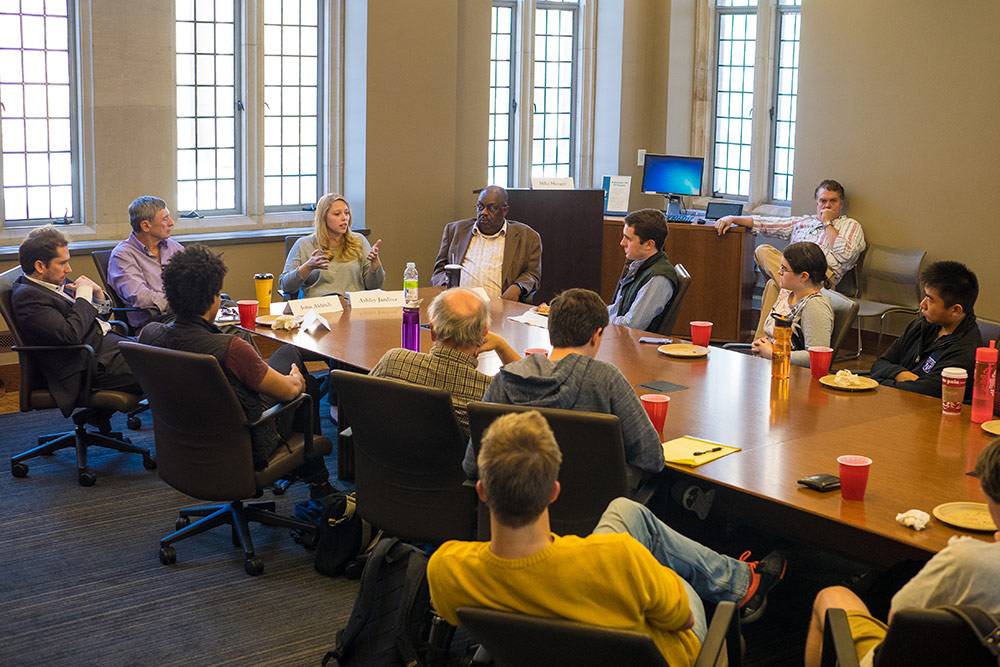What Can We Expect on Nov. 8, and After?
Professor Michael Munger says voter turnout would need to be low for Donald Trump to be elected.

With the presidential election just days away, five members of Duke’s political science department gathered Wednesday to both predict the outcome and suggest what it might mean for the country moving forward.
Visiting instructor Darren Beattie said he believes Donald Trump will win on Nov. 8. “I actually very much welcome that outcome,” added Beattie, who earned a Ph.D. from Duke earlier this year.
After Wednesday’s panel, Beattie said that unlike Barack Obama’s run for the presidency, there appears to be little enthusiasm for Hillary Clinton’s candidacy, even among her supporters. Voters “are more animated by the threat of Trump.”
That may lead to a suppressed turnout for Clinton among traditional Democratic voters, especially among minority voters.
Beattie said neither the Republicans nor the Democrats have responded to voter dissatisfaction with the status quo. The Republicans, he said, “still think that running an empty suit” reflects the conservative movement, and Trump killed that notion in the primaries.
Meanwhile, the Democrats have put up a candidate who, he said, represents “corporate cronyism and mindless intervention.”
While the other panelists disagreed with Beattie on several points, including who they expect to win next Tuesday, there were a few areas of agreement.

Kerry Haynie discussed the meaning of Donald Trump's nomination for the Republican Party.
Professor Michael Munger said for Trump to win, voter turnout would need to be low. He called Clinton’s support “broad but shallow,” adding he expects Trump supporters will show up on Election Day.
He said it’s also possible that polls might not be picking up on some voter sentiments that could impact the election.
If the Republicans do lose the presidency, it will force them to contemplate their future ahead of the 2020 election, said professor John Aldrich, who specializes in American politics and behavior. And, because they had won, the Democrats would likely delay such a self-examination, which could potentially hurt them long-term.
Aldrich said control of the Senate looks like a toss-up. He said if Clinton is elected and the Democrats retake control of the Senate, look for an expansion of current rules that limit filibustering so that Supreme Court justices can be selected.
Assistant professor Ashley Jardina, whose research includes racial attitudes of voters, does wonder what might happen to Trump voters if Clinton were to win. “Where do they go? This group has been even more marginalized; Clinton called them deplorables.”
Jardina added she expects sexism and gender backlash to move to the fore if Clinton wins, much like racial animus did when Obama was elected.
Professor Kerry Haynie said he was not surprised that Trump wound up being the Republican Party’s nominee. “He’s merely shouting what the Republican Party has been whispering for decades.”
He disagreed with Beattie’s contention that voters will be swayed by recent news that new emails related to the Clinton server case have been discovered. “I never understood undecided voters,” Haynie said, adding that people are not going to change their minds at this point.
Haynie, who recently led a class trip to South Africa, said he was constantly questioned abroad about Trump, who he said isn’t taken seriously by foreigners.
Beattie said Clinton has been in favor of every single U.S. military intervention in the last 30 years, and her election could lead to conflict with Russia over Syria. Trump, he suggested, is more of an anti-war candidate.
At a minimum, Beattie said, Americans deserve a more public conversation about U.S. involvement in military conflicts.